- Home
- Jhumpa Lahiri
Interpreter of Maladies Page 4
Interpreter of Maladies Read online
Page 4
During the commercial my mother went to the kitchen to get more rice, and my father and Mr. Pirzada deplored the policies of a general named Yahyah Khan. They discussed intrigues I did not know, a catastrophe I could not comprehend. "See, children your age, what they do to survive," my father said as he served me another piece of fish. But I could no longer eat. I could only steal glances at Mr. Pirzada, sitting beside me in his olive green jacket, calmly creating a well in his rice to make room for a second helping of lentils. He was not my notion of a man burdened by such grave concerns. I wondered if the reason he was always so smartly dressed was in preparation to endure with dignity whatever news assailed him, perhaps even to attend a funeral at a moment's notice. I wondered, too, what would happen if suddenly his seven daughters were to appear on television, smiling and waving and blowing kisses to Mr. Pirzada from a balcony. I imagined how relieved he would be. But this never happened.
That night when I placed the plastic egg filled with cinnamon hearts in the box beside my bed, I did not feel the ceremonious satisfaction I normally did. I tried not to think about Mr. Pirzada, in his lime-scented overcoat, connected to the unruly, sweltering world we had viewed a few hours ago in our bright, carpeted living room. And yet for several moments that was all I could think about. My stomach tightened as I worried whether his wife and seven daughters were now members of the drifting, clamoring crowd that had flashed at intervals on the screen. In an effort to banish the image I looked around my room, at the yellow canopied bed with matching flounced curtains, at framed class pictures mounted on white and violet papered walls, at the penciled inscriptions by the closet door where my father recorded my height on each of my birthdays. But the more I tried to distract myself, the more I began to convince myself that Mr. Pirzada's family was in all likelihood dead. Eventually I took a square of white chocolate out of the box, and unwrapped it, and then I did something I had never done before. I put the chocolate in my mouth, letting it soften until the last possible moment, and then as I chewed it slowly, I prayed that Mr. Pirzada's family was safe and sound. I had never prayed for anything before, had never been taught or told to, but I decided, given the circumstances, that it was something I should do. That night when I went to the bathroom I only pretended to brush my teeth, for I feared that I would somehow rinse the prayer out as well. I wet the brush and rearranged the tube of paste to prevent my parents from asking any questions, and fell asleep with sugar on my tongue.
No one at school talked about the war followed so faithfully in my living room. We continued to study the American Revolution, and learned about the injustices of taxation without representation, and memorized passages from the Declaration of Independence. During recess the boys would divide in two groups, chasing each other wildly around the swings and seesaws, Redcoats against the colonies. In the classroom our teacher, Mrs. Kenyon, pointed frequently to a map that emerged like a movie screen from the top of the chalkboard, charting the route of the Mayflower, or showing us the location of the Liberty Bell. Each week two members of the class gave a report on a particular aspect of the Revolution, and so one day I was sent to the school library with my friend Dora to learn about the surrender at Yorktown. Mrs. Kenyon handed us a slip of paper with the names of three books to look up in the card catalogue. We found them right away, and sat down at a low round table to read and take notes. But I could not concentrate. I returned to the blond-wood shelves, to a section I had noticed labeled "Asia." I saw books about China, India, Indonesia, Korea. Eventually I found a book titled Pakistan: A Land and Its People. I sat on a footstool and opened the book. The laminated jacket crackled in my grip. I began turning the pages, filled with photos of rivers and rice fields and men in military uniforms. There was a chapter about Dacca, and I began to read about its rainfall, and its jute production. I was studying a population chart when Dora appeared in the aisle.
"What are you doing back here? Mrs. Kenyon's in the library. She came to check up on us."
I slammed the book shut, too loudly. Mrs. Kenyon emerged, the aroma of her perfume filling up the tiny aisle, and lifted the book by the tip of its spine as if it were a hair clinging to my sweater. She glanced at the cover, then at me.
"Is this book a part of your report, Lilia?"
"No, Mrs. Kenyon."
"Then I see no reason to consult it," she said, replacing it in the slim gap on the shelf. "Do you?"
***
As weeks passed it grew more and more rare to see any footage from Dacca on the news. The report came after the first set of commercials, sometimes the second. The press had been censored, removed, restricted, rerouted. Some days, many days, only a death toll was announced, prefaced by a reiteration of the general situation. More poets were executed, more villages set ablaze. In spite of it all, night after night, my parents and Mr. Pirzada enjoyed long, leisurely meals. After the television was shut off, and the dishes washed and dried, they joked, and told stories, and dipped biscuits in their tea. When they tired of discussing political matters they discussed, instead, the progress of Mr. Pirzada's book about the deciduous trees of New England, and my father's nomination for tenure, and the peculiar eating habits of my mother's American coworkers at the bank. Eventually I was sent upstairs to do my homework, but through the carpet I heard them as they drank more tea, and listened to cassettes of Kishore Kumar, and played Scrabble on the coffee table, laughing and arguing long into the night about the spellings of English words. I wanted to join them, wanted, above all, to console Mr. Pirzada somehow. But apart from eating a piece of candy for the sake of his family and praying for their safety, there was nothing I could do. They played Scrabble until the eleven o'clock news, and then, sometime around midnight, Mr. Pirzada walked back to his dormitory. For this reason I never saw him leave, but each night as I drifted off to sleep I would hear them, anticipating the birth of a nation on the other side of the world.
One day in October Mr. Pirzada asked upon arrival, "What are these large orange vegetables on people's doorsteps? A type of squash?"
"Pumpkins," my mother replied. "Lilia, remind me to pick one up at the supermarket."
"And the purpose? It indicates what?"
"You make a jack-o'-lantern," I said, grinning ferociously. "Like this. To scare people away."
"I see," Mr. Pirzada said, grinning back. "Very useful."
The next day my mother bought a ten-pound pumpkin, fat and round, and placed it on the dining table. Before supper, while my father and Mr. Pirzada were watching the local news, she told me to decorate it with markers, but I wanted to carve it properly like others I had noticed in the neighborhood.
"Yes, let's carve it," Mr. Pirzada agreed, and rose from the sofa. "Hang the news tonight." Asking no questions, he walked into the kitchen, opened a drawer, and returned, bearing a long serrated knife. He glanced at me for approval. "Shall I?"
I nodded. For the first time we all gathered around the dining table, my mother, my father, Mr. Pirzada, and I. While the television aired unattended we covered the tabletop with newspapers. Mr. Pirzada draped his jacket over the chair behind him, removed a pair of opal cuff links, and rolled up the starched sleeves of his shirt.
"First go around the top, like this," I instructed, demonstrating with my index finger.
He made an initial incision and drew the knife around. When he had come full circle he lifted the cap by the stem; it loosened effortlessly, and Mr. Pirzada leaned over the pumpkin for a moment to inspect and inhale its contents. My mother gave him a long metal spoon with which he gutted the interior until the last bits of string and seeds were gone. My father, meanwhile, separated the seeds from the pulp and set them out to dry on a cookie sheet, so that we could roast them later on. I drew two triangles against the ridged surface for the eyes, which Mr. Pirzada dutifully carved, and crescents for eyebrows, and another triangle for the nose. The mouth was all that remained, and the teeth posed a challenge. I hesitated.
"Smile or frown?" I asked.
"You ch
oose," Mr. Pirzada said.
As a compromise I drew a kind of grimace, straight across, neither mournful nor friendly. Mr. Pirzada began carving, without the least bit of intimidation, as if he had been carving jack-o'-lanterns his whole life. He had nearly finished when the national news began. The reporter mentioned Dacca, and we all turned to listen: An Indian official announced that unless the world helped to relieve the burden of East Pakistani refugees, India would have to go to war against Pakistan. The reporter's face dripped with sweat as he relayed the information. He did not wear a tie or a jacket, dressed instead as if he himself were about to take part in the battle. He shielded his scorched face as he hollered things to the cameraman. The knife slipped from Mr. Pirzada's hand and made a gash dipping toward the base of the pumpkin.
"Please forgive me." He raised a hand to one side of his face, as if someone had slapped him there. "I am—it is terrible. I will buy another. We will try again."
"Not at all, not at all," my father said. He took the knife from Mr. Pirzada, and carved around the gash, evening it out, dispensing altogether with the teeth I had drawn. What resulted was a disproportionately large hole the size of a lemon, so that our jack-o'-lantern wore an expression of placid astonishment, the eyebrows no longer fierce, floating in frozen surprise above a vacant, geometric gaze.
For Halloween I was a witch. Dora, my trick-or-treating partner, was a witch too. We wore black capes fashioned from dyed pillowcases and conical hats with wide cardboard brims. We shaded our faces green with a broken eye shadow that belonged to Dora's mother, and my mother gave us two burlap sacks that had once contained basmati rice, for collecting candy. That year our parents decided that we were old enough to roam the neighborhood unattended. Our plan was to walk from my house to Dora's, from where I was to call to say I had arrived safely, and then Dora's mother would drive me home. My father equipped us with flashlights, and I had to wear my watch and synchronize it with his. We were to return no later than nine o'clock.
When Mr. Pirzada arrived that evening he presented me with a box of chocolate-covered mints.
"In here," I told him, and opened up the burlap sack. "Trick or treat!"
"I understand that you don't really need my contribution this evening," he said, depositing the box. He gazed at my green face, and the hat secured by a string under my chin. Gingerly he lifted the hem of the cape, under which I was wearing a sweater and a zipped fleece jacket. "Will you be warm enough?"
I nodded, causing the hat to tip to one side.
He set it right. "Perhaps it is best to stand still."
The bottom of our staircase was lined with baskets of miniature candy, and when Mr. Pirzada removed his shoes he did not place them there as he normally did, but inside the closet instead. He began to unbutton his coat, and I waited to take it from him, but Dora called me from the bathroom to say that she needed my help drawing a mole on her chin. When we were finally ready my mother took a picture of us in front of the fireplace, and then I opened the front door to leave. Mr. Pirzada and my father, who had not gone into the living room yet, hovered in the foyer. Outside it was already dark. The air smelled of wet leaves, and our carved jack-o'-lantern flickered impressively against the shrubbery by the door. In the distance came the sounds of scampering feet, and the howls of the older boys who wore no costume at all other than a rubber mask, and the rustling apparel of the youngest children, some so young that they were carried from door to door in the arms of their parents.
"Don't go into any of the houses you don't know," my father warned.
Mr. Pirzada knit his brows together. "Is there any danger?"
"No, no," my mother assured him. "All the children will be out. It's a tradition."
"Perhaps I should accompany them?" Mr. Pirzada suggested. He looked suddenly tired and small, standing there in his splayed, stockinged feet, and his eyes contained a panic I had never seen before. In spite of the cold I began to sweat inside my pillowcase.
"Really, Mr. Pirzada," my mother said, "Lilia will be perfectly safe with her friend."
"But if it rains? If they lose their way?"
"Don't worry," I said. It was the first time I had uttered those words to Mr. Pirzada, two simple words I had tried but failed to tell him for weeks, had said only in my prayers. It shamed me now that I had said them for my own sake.
He placed one of his stocky fingers on my cheek, then pressed it to the back of his own hand, leaving a faint green smear. "If the lady insists," he conceded, and offered a small bow.
We left, stumbling slightly in our black pointy thrift-store shoes, and when we turned at the end of the driveway to wave good-bye, Mr. Pirzada was standing in the frame of the doorway, a short figure between my parents, waving back.
"Why did that man want to come with us?" Dora asked.
"His daughters are missing." As soon as I said it, I wished I had not. I felt that my saying it made it true, that Mr. Pirzada's daughters really were missing, and that he would never see them again.
"You mean they were kidnapped?" Dora continued. "From a park or something?"
"I didn't mean they were missing. I meant, he misses them. They live in a different country, and he hasn't seen them in a while, that's all."
We went from house to house, walking along pathways and pressing doorbells. Some people had switched off all their lights for effect, or strung rubber bats in their windows. At the McIntyres' a coffin was placed in front of the door, and Mr. McIntyre rose from it in silence, his face covered with chalk, and deposited a fistful of candy corns into our sacks. Several people told me that they had never seen an Indian witch before. Others performed the transaction without comment. As we paved our way with the parallel beams of our flashlights we saw eggs cracked in the middle of the road, and cars covered with shaving cream, and toilet paper garlanding the branches of trees. By the time we reached Dora's house our hands were chapped from carrying our bulging burlap bags, and our feet were sore and swollen. Her mother gave us bandages for our blisters and served us warm cider and caramel popcorn. She reminded me to call my parents to tell them I had arrived safely, and when I did I could hear the television in the background. My mother did not seem particularly relieved to hear from me. When I replaced the phone on the receiver it occurred to me that the television wasn't on at Dora's house at all. Her father was lying on the couch, reading a magazine, with a glass of wine on the coffee table, and there was saxophone music playing on the stereo.
After Dora and I had sorted through our plunder, and counted and sampled and traded until we were satisfied, her mother drove me back to my house. I thanked her for the ride, and she waited in the driveway until I made it to the door. In the glare of her headlights I saw that our pumpkin had been shattered, its thick shell strewn in chunks across the grass. I felt the sting of tears in my eyes, and a sudden pain in my throat, as if it had been stuffed with the sharp tiny pebbles that crunched with each step under my aching feet. I opened the door, expecting the three of them to be standing in the foyer, waiting to receive me, and to grieve for our ruined pumpkin, but there was no one. In the living room Mr. Pirzada, my father, and mother were sitting side by side on the sofa. The television was turned off, and Mr. Pirzada had his head in his hands.
What they heard that evening, and for many evenings after that, was that India and Pakistan were drawing closer and closer to war. Troops from both sides lined the border, and Dacca was insisting on nothing short of independence. The war was to be waged on East Pakistani soil. The United States was siding with West Pakistan, the Soviet Union with India and what was soon to be Bangladesh. War was declared officially on December 4, and twelve days later, the Pakistani army, weakened by having to fight three thousand miles from its source of supplies, surrendered in Dacca. All of these facts I know only now, for they are available to me in any history book, in any library. But then it remained, for the most part, a remote mystery with haphazard clues. What I remember during those twelve days of the war was that my father no longe
r asked me to watch the news with them, and that Mr. Pirzada stopped bringing me candy, and that my mother refused to serve anything other than boiled eggs with rice for dinner. I remember some nights helping my mother spread a sheet and blankets on the couch so that Mr. Pirzada could sleep there, and high-pitched voices hollering in the middle of the night when my parents called our relatives in Calcutta to learn more details about the situation. Most of all I remember the three of them operating during that time as if they were a single person, sharing a single meal, a single body, a single silence, and a single fear.
In January, Mr. Pirzada flew back to his three-story home in Dacca, to discover what was left of it. We did not see much of him in those final weeks of the year; he was busy finishing his manuscript, and we went to Philadelphia to spend Christmas with friends of my parents. Just as I have no memory of his first visit, I have no memory of his last. My father drove him to the airport one afternoon while I was at school. For a long time we did not hear from him. Our evenings went on as usual, with dinners in front of the news. The only difference was that Mr. Pirzada and his extra watch were not there to accompany us. According to reports Dacca was repairing itself slowly, with a newly formed parliamentary government. The new leader, Sheikh Mujib Rahman, recently released from prison, asked countries for building materials to replace more than one million houses that had been destroyed in the war. Countless refugees returned from India, greeted, we learned, by unemployment and the threat of famine. Every now and then I studied the map above my father's desk and pictured Mr. Pirzada on that small patch of yellow, perspiring heavily, I imagined, in one of his suits, searching for his family. Of course, the map was outdated by then.

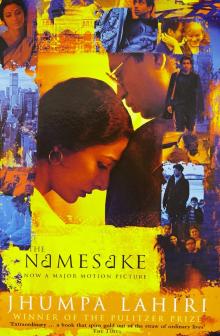 The Namesake
The Namesake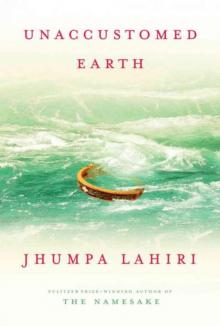 Nobody's Business
Nobody's Business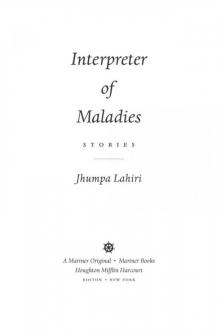 Interpreter of Maladies
Interpreter of Maladies Hell-Heaven
Hell-Heaven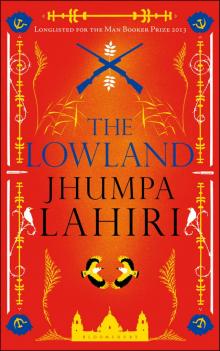 The Lowland
The Lowland Unaccustomed Earth
Unaccustomed Earth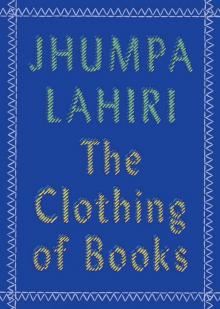 The Clothing of Books
The Clothing of Books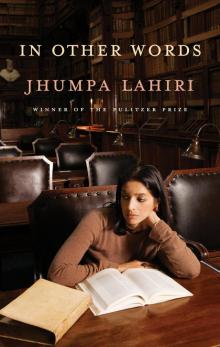 In Other Words
In Other Words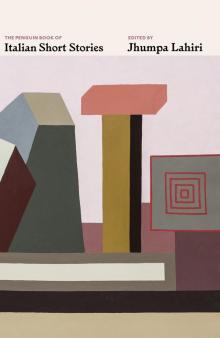 The Penguin Book of Italian Short Stories
The Penguin Book of Italian Short Stories